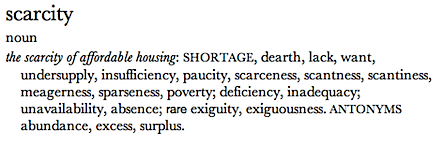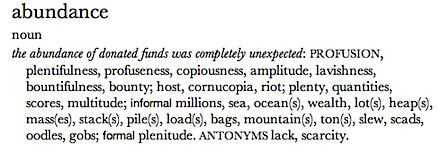Shifts in scarcity and abundance
Shift in market dynamics
It is really nothing new that business is based on exploiting scarcity. You create something scarce and sell it with profit. Great stuff! But when the scarce things become common you need to rethink what you are actually doing. The same thing happens when some common abundant things become scarce. The only thing that differs the two is that with former you realize the reason why you are loosing sales but with latter you will be able to start winning new sales.
What is scarcity?
The dictionary defines scarcity in the following way:

What used to be scarce?
Few years back following things used to be scarce. Large number of successful businesses exploited the scarcity (have a look at the brackets) with great success:
Hard-disk capacity (Seagate, Western Digital, Samsung, Hitachi, etc)
Manufacturing capacity (Flextronics, Foxconn, etc.)
Mobile telephony (Vodafone, AT&T, Samsung, Nokia, SonyEricsson, LG, etc)
Overnight shipping (DHL, TNT, FedEx, UPS,etc)
Airtime in TV or radio (CNN, BBC, national TV broadcasters, etc)
Shelf space in retail stores (Spar, Wallmart, Tesco, Carrefour, etc)
Credit cards (VISA, MasterCard, Amex, etc)
Some of these companies are still going strong but none of them are booming anymore.
Very likely your business was (and hopefully still is) based on scarcity. Have you considered if your products or services are still genuinely scarce? Are you honest to yourself in this judgement? Are you thinking straight and without emotional legacy?
What is abundant?
The dictionary defines abundance in the following way:

What used to be abundant, but is now becoming scarce?
There are clear signs that for instance following things, that used to be plentiful, are becoming extremely scarce. Have a look at the companies or brands that are exploiting the new scarcity, again in brackets:
Spare time (Apple iTunes, ebay, Amazon.com, Google Maps)
Attention (Google, Google Adwords, youtube, Vimeo, Digg, twitter)
Permission to pollute (airlines, western manufacturing industry, car industry)
Trust (PayPal, ebanking, anti-virus software, consultancy industry, tax advisory)
Open space (ski resorts, sailing charters, the whole holiday industry)
Clean water (Evian, Pellegrino)
You probably agree with the above scarcity shift. You may even have noticed it yourself in your daily life or in you business. But do you live the change yourself? The core of the success remains in the following questions or actually being able to answer them:
1. what does the scarcity shift mean to your business?
2. what are the concrete actions that you have taken to exploit to the shift?
It pays of to invest a bit of your scarce time to this topic, to think about it and most importantly to be honest to yourself.
CASE: Why it is good to be iTunes?
iTunes is a creature of our times – it takes advantage of the new scarcity at the same time as it embraces the atomization of the world. It rewards individuals who want a single track of music, not an entire album. iTunes replaced the large record retailers because it increases the speed of finding what you want, eliminated the need to get into your car, and saved your precious time (scarcity: spare time).
As soon as Apple put an iPod or iPhone into your pocket and the iTunes into your laptop, they had the leverage they needed to sell you music and to change to whole music industry. This was not because you could not find music anywhere else. Music was, as a matter of fact, very easy to find. The success factors of iTunes were (and still are) the massive selection of music that is easy to browse, detailed knowledge of who you are and what you like and the ability to save you hours if time.
The traditional “brick and mortar” music retail served an important function when people were looking for a way to spend an evening flipping through records and the only place to do that was retail store. iTunes defeated traditional retail because the importance of the scarcity of your time was radically changed.
